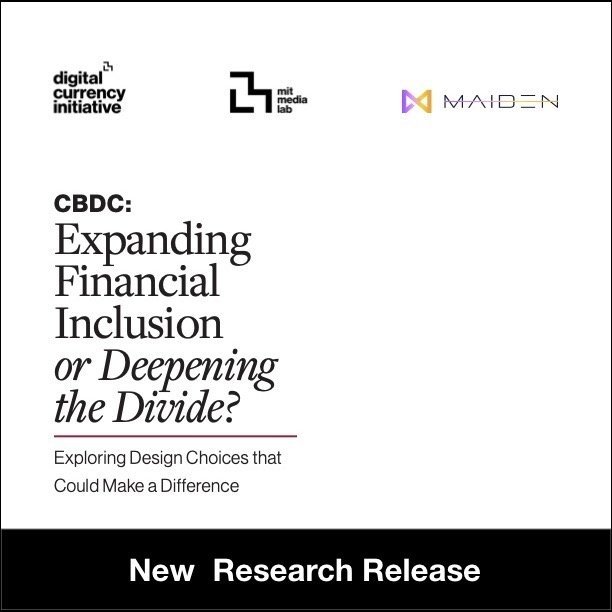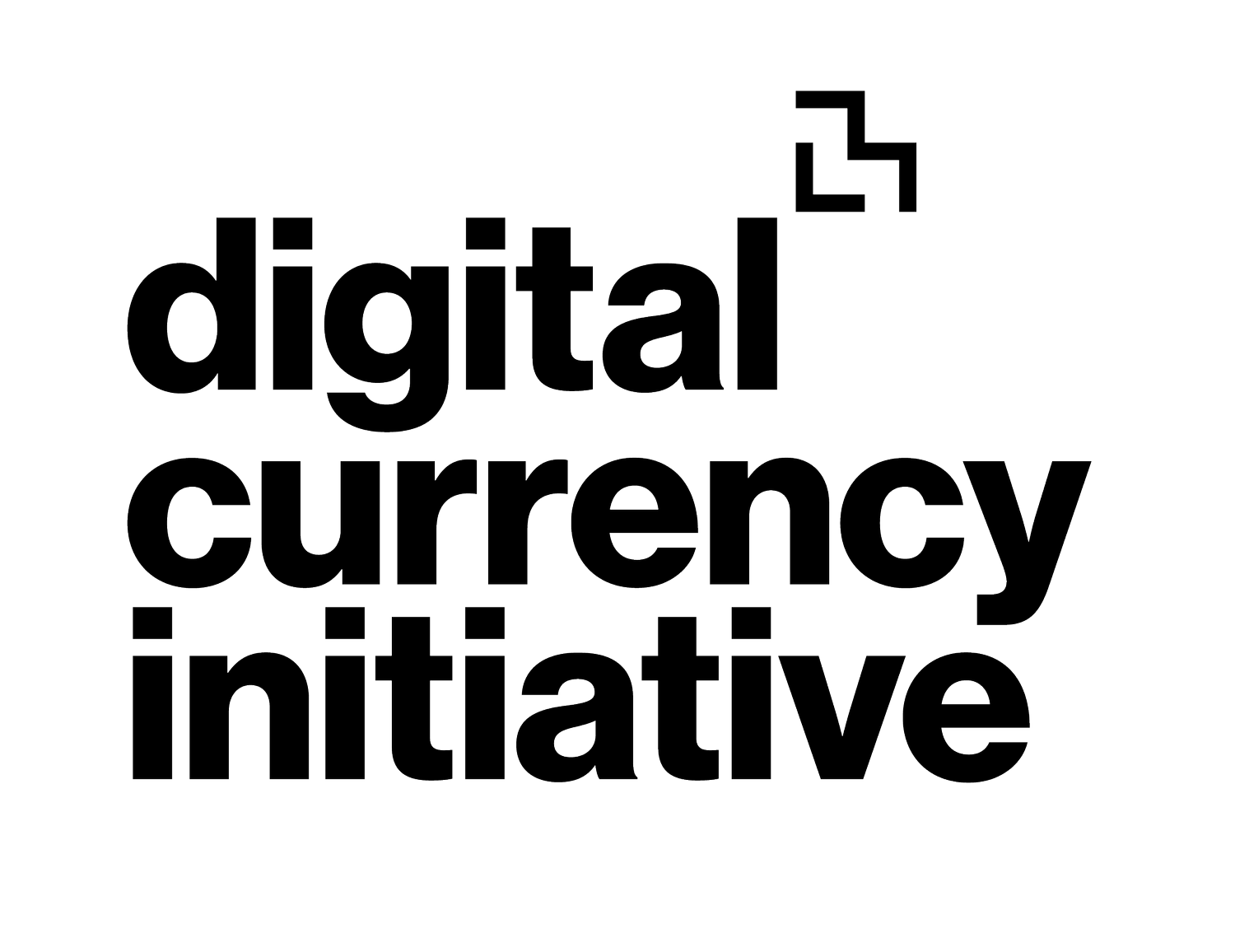
OMFIF: "CBDCs present new opportunities for handling disputes and fraud" by DCI Team Members
Potential designs may involve intermediaries in new and different ways
Central bank digital currencies potentially offer, in a digital form, the advantages of central bank money: settlement finality, liquidity and integrity. However, both offline and online commerce are susceptible to fraud and other kinds of disagreements. The existing techniques for managing fraud and disputes focus on giving users easy access to chargebacks, which relies on intermediaries to resolve disputes. Potential designs for CBDC may involve intermediaries in new and different ways, or may not use intermediaries at all, calling into question how to address fraud if CBDCs become widely used.

CoinDesk’s Money Reimagined: "Back to Basics After ‘Token Casinos’ Wreaked Havoc, With Neha Narula"
On this episode of “Money Reimagined,” Michael Casey, solo in Davos, Switzerland, on the sidelines of the World Economic Forum, speaks with Neha Narula, the director of the MIT Digital Currency Initiative to discuss the trends of both digitalization and innovation pertaining to stablecoins, digital currencies and the future of public money,

Axios Reception at Davos: Crypto’s Crossroads
On Tuesday, January 17th at the World Economic Forum in Davos, Switzerland, Axios markets reporter Courtenay Brown and MIT Media Lab Digital Currency Initiative director Neha Narula considered the most pressing issues facing cryptocurrency today including how (and if) the industry should be regulated, how governments and financial institutions should interact with the sector, and how investments could be safeguarded. The View from the Top sponsored segment featured Ripple chief executive officer Brad Garlinghouse.

CoinDesk names MIT one of the “Best Universities for Blockchain 2022”
A private research university established in 1861, the Massachusetts Institute of Technology (MIT) is one of the world’s most prestigious schools and ranked first in the QS World University Rankings in 2023 due to its academic and research excellence in multiple fields, including blockchain.

WBUR's Tales from the Crypto | Part I: Ukraine's NFTs and the 'Fyre Fest' of cryptocurrency
The Endless Thread team is excited to introduce a new mini-series: Tales from the Crypto, or three windows into the wild world of cryptocurrency. It's a landscape ripe for investors, gamblers, opportunists, and academic investigators — both online and offline. At every turn, our hosts and producers have turned to experts to make sense of this volatile, ever expanding terrain.
In the series' first installment, co-hosts Ben Brock Johnson and Amory Sivertson dive into a viral tweet about NFTs aiding Ukrainians with the war effort against Russia, as well as plans for a crypto island paradise that was never meant to be.

Nicolas Xuan-Yi Zhang, "A Multi-Currency Exchange and Contracting Platform"
The DCI’s Nicolas Xuan-Yi Zhang coauthored a paper at IMF on multi-currency exchange.
Cross-border payments can be slow, expensive, and risky. They are intermediated by counterparties in different jurisdictions which rely on costly trusted relationships to offset the lack of a common settlement asset as well as common rules and governance. In this paper, we present a vision for a multilateral platform that could improve cross-border payments, as well as related foreign exchange transactions, risk sharing, and more generally, financial contracting. The approach is to leverage technological innovations for public policy objectives. A common ledger, smart contracts, and encryption offer significant gains to market efficiency, completeness, and access, as well as to transparency, transaction and compliance costs, and safety. This paper is a first step aiming to stimulate further work in this space.

MIT, Maiden Labs examine CBDC inclusiveness issues in report from 4 countries
The Massachusetts Institute of Technology (MIT) Digital Currency Initiative (DCI) and associated organizations marshaled a sizable team of researchers in four low- and middle-income countries — India, Indonesia, Nigeria and Mexico — to study inclusion issues related to retail central bank digital currency (CBDC) design. They released the results of their 15-month research project on Jan. 13.

DCI Newsletter Issue #14 - September-December 2022
In this issue:
Join the DCI for a new research release on financial inclusion
Call for papers for the next issue of Cryptoeconomic Systems
DCI paper accepted at NSDI
And more!

DCI Newsletter Issue #13 - June-August 2022
In this issue:
Join the DCI at AFT'22
CBDC and financial inclusion research release date announced
Call for papers for the next issue of Cryptoeconomic Systems
A fond farewell to Tadge Dryja
And more!

The MIT Digital Currency Initiative bids farewell to Tadge Dryja
Five years ago, I was in the Boston area for a week and I hung out at the DCI.
It wasn't much of a space back then—really more like a closet. But there were ethernet ports in the walls, assorted cables, and computer accessories, and a couch with occasional undergrads hanging out, coding, or discussing the finer points of cryptocurrencies. It was welcoming, and a lot of fun. I brought a computer and started working, and talking to people about Bitcoin, and helping some students with their projects…

CoinDesk’s Money Reimagined "The Coming Digital Currency War
A Consensus panel from Austin, Texas, "Money Reimagined" host Michael Casey starts off the introductions of an important discussion with Emily Parker, CoinDesk's executive director of global content; the Honorable J. Christopher Giancarlo, dubbed “CryptoDad,” served as 13th Chairman of the United States Commodity Futures Trading Commission; and Neha Narula is the Director of the Digital Currency Initiative at the MIT Media Lab, to discuss the social and geo-political implications of the rise of international competition between central bank digital currencies, stablecoins and native crypto currencies.

MIT Technology Review: “The MIT researcher who helps senators understand digital currencies“
Last summer, a special subcommittee of the US Senate met remotely to weigh the benefits of launching a central-bank digital currency, or CBDC—something that could, if optimally designed, transform the US financial system, making it more accessible to more citizens. For senators staring intently at their laptops, this was basically the first day of digital-currency school. And to introduce them to this highly technical world, the first witness that Senator Elizabeth Warren called was MIT Digital Currency Initiative director Neha Narula.

DCI Newsletter Issue #12 - January-May 2022
In this issue:
Volume 2, Issue 1 of Cryptoeconomic Systems out now.
OpenCBDC announces new collaborations and newly-opensourced projects.
User research projects in the US and globally.
The DCI team expands.
And more!

MIT Digital Currency Initiative (DCI) announces research collaboration with the Bank of England on central bank digital currency
The Bank of England announced an agreement to collaborate on a twelve-month Central Bank Digital Currency (CBDC) research project with MIT Digital Currency Initiative. The agreement supports and builds on DCI’s ongoing research into CBDC, while also contributing to the Bank of England’s wider research and exploration of central bank digital currencies. While no decision has been made on whether or not to introduce a CBDC in the UK, the work will investigate and experiment with potential CBDC technology designs and approaches, and evaluate key tradeoffs, opportunities, and risks. This type of research can help inform wider policy development by contributing important technical ideas and questions.

MIT Digital Currency Initiative (DCI) announces research collaboration with the Bank of Canada on central bank digital currency
Today, the Bank of Canada announced an agreement to collaborate on a twelve-month CBDC research project with the MIT Digital Currency Initiative. The agreement supports and builds on the DCI’s ongoing research into CBDC, while also contributing to the Bank of Canada’s wider research agenda into digital currencies and fintech. The work will investigate and experiment with potential CBDC technology designs and approaches, and evaluate key tradeoffs, opportunities, and risks. While no decision has been made on whether or not to introduce a CBDC in Canada, this type of research can help inform wider policy development by contributing important technical ideas and questions.

DCI Newsletter Issue #11 - Q4 2021+
In this issue:
The release of Project Hamilton, a collaboration between the Federal Reserve Bank of Boston and the DCI
Taproot activation, and recognition for AJ Towns as one of the most influential developers of 2021
The DCI is hiring a software engineer
The next issue of Cyptoeconomic Systems
MIT Bitcoin Club’s upcoming hackathon at Bitcoin EXPO (May 6-8)

DCI Newsletter Special Issue - Project Hamilton (FRBB<>MIT DCI)
Today, the MIT Digital Currency Initiative is releasing the phase one outputs of Project Hamilton, our multi-year research collaboration with the Federal Reserve Bank of Boston. Our release includes a technical paper, “A High Performance Payment Processing System Designed for Central Bank Digital Currencies,” and an open source codebase, OpenCBDC.
You can read more about the release in MIT News here.

MIT DCI Releases Project Hamilton, OpenCBDC Papers and Open Source Code Base
Read the technical paper, A High Performance Payment Processing System Designed for Central Bank Digital Currencies, and executive summary here.

MIT News: "MIT experts test technical research for a hypothetical central bank digital currency"
Collaboration with Federal Reserve Bank of Boston yields progress in understanding how a digital currency might be developed in the future.
CAMBRIDGE, Mass. -- In collaboration with a team at the Federal Reserve Bank of Boston, MIT experts have begun designing and testing technical research through which further examination of a Central Bank Digital Currency (CBDC) can be performed in the U.S.
The effort, known as Project Hamilton, is in an exploratory phase, and the research is not intended as a pilot or for public deployment. Instead, the researchers have explored two different approaches that could be used to process transactions, and thus could indicate the technical feasibility of a potential CBDC model. In a process involving significant design flexibility, the MIT group tested factors such as the volume and speed of transactions, and the resilience of the systems in general, among other requirements for a viable digital currency.

AJ Towns listed as one of the "Most Influential 2021: The Developers Who Wrote Bitcoin’s Taproot Upgrade"
Nick along with A.J. Towns, Tim Ruffing and Pieter Wuille are the authors credited for writing the three BIPs that made up Taproot, the most significant Bitcoin upgrade in four years.
